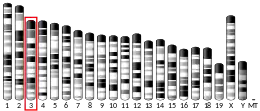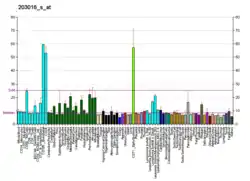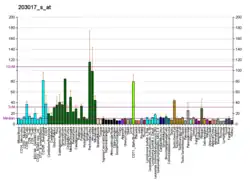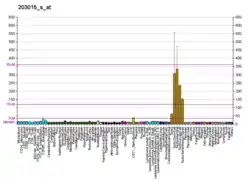SSX2IP
Afadin- and alpha-actinin-binding protein is a protein that in humans is encoded by the SSX2IP gene.[5] It has been shown that it functions together with WDR8 in centrosome maturation, ensuring proper spindle length and orientation.[6][7][8][9][10] The SSX2IP-WDR8 complex additionally promotes ciliary vesicle docking during ciliogenesis.[11][12]
| SSX2IP | |||||||||||||||||||||||||||||||||||||||||||||||||||
|---|---|---|---|---|---|---|---|---|---|---|---|---|---|---|---|---|---|---|---|---|---|---|---|---|---|---|---|---|---|---|---|---|---|---|---|---|---|---|---|---|---|---|---|---|---|---|---|---|---|---|---|
| |||||||||||||||||||||||||||||||||||||||||||||||||||
| Identifiers | |||||||||||||||||||||||||||||||||||||||||||||||||||
| Aliases | SSX2IP, ADIP, synovial sarcoma, X breakpoint 2 interacting protein, SSX family member 2 interacting protein, hMsd1 | ||||||||||||||||||||||||||||||||||||||||||||||||||
| External IDs | OMIM: 608690 MGI: 2139150 HomoloGene: 8522 GeneCards: SSX2IP | ||||||||||||||||||||||||||||||||||||||||||||||||||
| |||||||||||||||||||||||||||||||||||||||||||||||||||
| |||||||||||||||||||||||||||||||||||||||||||||||||||
| |||||||||||||||||||||||||||||||||||||||||||||||||||
| |||||||||||||||||||||||||||||||||||||||||||||||||||
| |||||||||||||||||||||||||||||||||||||||||||||||||||
| Wikidata | |||||||||||||||||||||||||||||||||||||||||||||||||||
| |||||||||||||||||||||||||||||||||||||||||||||||||||
Interactions
SSX2IP has been initially described as a protein to interact with MLLT4[13] and Actinin, alpha 1.[13] In the context of centrosome maturation and ciliogenesis it has been shown to interact with WDR8.[8][9][11]
References
- GRCh38: Ensembl release 89: ENSG00000117155 - Ensembl, May 2017
- GRCm38: Ensembl release 89: ENSMUSG00000036825 - Ensembl, May 2017
- "Human PubMed Reference:". National Center for Biotechnology Information, U.S. National Library of Medicine.
- "Mouse PubMed Reference:". National Center for Biotechnology Information, U.S. National Library of Medicine.
- "Entrez Gene: SSX2IP synovial sarcoma, X breakpoint 2 interacting protein".
- Bärenz F, Inoue D, Yokoyama H, Tegha-Dunghu J, Freiss S, Draeger S, et al. (July 2013). "The centriolar satellite protein SSX2IP promotes centrosome maturation". The Journal of Cell Biology. 202 (1): 81–95. doi:10.1083/jcb.201302122. PMC 3704989. PMID 23816619.
- Yukawa M, Ikebe C, Toda T (May 2015). "The Msd1-Wdr8-Pkl1 complex anchors microtubule minus ends to fission yeast spindle pole bodies". The Journal of Cell Biology. 209 (4): 549–62. doi:10.1083/jcb.201412111. PMC 4442821. PMID 25987607.
- Inoue D, Stemmer M, Thumberger T, Ruppert T, Bärenz F, Wittbrodt J, Gruss OJ (January 2017). "Expression of the novel maternal centrosome assembly factor Wdr8 is required for vertebrate embryonic mitoses". Nature Communications. 8: 14090. Bibcode:2017NatCo...814090I. doi:10.1038/ncomms14090. PMC 5253655. PMID 28098238.
- Hori A, Morand A, Ikebe C, Frith D, Snijders AP, Toda T (2015-12-04). "The conserved Wdr8-hMsd1/SSX2IP complex localises to the centrosome and ensures proper spindle length and orientation". Biochemical and Biophysical Research Communications. 468 (1–2): 39–45. doi:10.1016/j.bbrc.2015.10.169. PMC 4669408. PMID 26545777.
- Hori A, Peddie CJ, Collinson LM, Toda T (June 2015). "Centriolar satellite- and hMsd1/SSX2IP-dependent microtubule anchoring is critical for centriole assembly". Molecular Biology of the Cell. 26 (11): 2005–19. doi:10.1091/mbc.E14-11-1561. PMC 4472012. PMID 25833712.
- Kurtulmus B, Wang W, Ruppert T, Neuner A, Cerikan B, Viol L, Dueñas-Sánchez R, Gruss OJ, Pereira G (February 2016). "WDR8 is a centriolar satellite and centriole-associated protein that promotes ciliary vesicle docking during ciliogenesis". Journal of Cell Science. 129 (3): 621–36. doi:10.1242/jcs.179713. PMID 26675238.
- Klinger M, Wang W, Kuhns S, Bärenz F, Dräger-Meurer S, Pereira G, Gruss OJ (February 2014). "The novel centriolar satellite protein SSX2IP targets Cep290 to the ciliary transition zone". Molecular Biology of the Cell. 25 (4): 495–507. doi:10.1091/mbc.E13-09-0526. PMC 3923641. PMID 24356449.
- Asada M, Irie K, Morimoto K, Yamada A, Ikeda W, Takeuchi M, Takai Y (February 2003). "ADIP, a novel Afadin- and alpha-actinin-binding protein localized at cell-cell adherens junctions". The Journal of Biological Chemistry. 278 (6): 4103–11. doi:10.1074/jbc.M209832200. PMID 12446711.
Further reading
- Nagase T, Ishikawa K, Suyama M, Kikuno R, Hirosawa M, Miyajima N, Tanaka A, Kotani H, Nomura N, Ohara O (February 1999). "Prediction of the coding sequences of unidentified human genes. XIII. The complete sequences of 100 new cDNA clones from brain which code for large proteins in vitro". DNA Research. 6 (1): 63–70. doi:10.1093/dnares/6.1.63. PMID 10231032.
- Hartley JL, Temple GF, Brasch MA (November 2000). "DNA cloning using in vitro site-specific recombination". Genome Research. 10 (11): 1788–95. doi:10.1101/gr.143000. PMC 310948. PMID 11076863.
- Wiemann S, Weil B, Wellenreuther R, Gassenhuber J, Glassl S, Ansorge W, Böcher M, Blöcker H, Bauersachs S, Blum H, Lauber J, Düsterhöft A, Beyer A, Köhrer K, Strack N, Mewes HW, Ottenwälder B, Obermaier B, Tampe J, Heubner D, Wambutt R, Korn B, Klein M, Poustka A (March 2001). "Toward a catalog of human genes and proteins: sequencing and analysis of 500 novel complete protein coding human cDNAs". Genome Research. 11 (3): 422–35. doi:10.1101/gr.GR1547R. PMC 311072. PMID 11230166.
- Simpson JC, Wellenreuther R, Poustka A, Pepperkok R, Wiemann S (September 2000). "Systematic subcellular localization of novel proteins identified by large-scale cDNA sequencing". EMBO Reports. 1 (3): 287–92. doi:10.1093/embo-reports/kvd058. PMC 1083732. PMID 11256614.
- de Bruijn DR, dos Santos NR, Kater-Baats E, Thijssen J, van den Berk L, Stap J, Balemans M, Schepens M, Merkx G, van Kessel AG (July 2002). "The cancer-related protein SSX2 interacts with the human homologue of a Ras-like GTPase interactor, RAB3IP, and a novel nuclear protein, SSX2IP". Genes, Chromosomes & Cancer. 34 (3): 285–98. doi:10.1002/gcc.10073. PMID 12007189. S2CID 11734893.
- Asada M, Irie K, Morimoto K, Yamada A, Ikeda W, Takeuchi M, Takai Y (February 2003). "ADIP, a novel Afadin- and alpha-actinin-binding protein localized at cell-cell adherens junctions". The Journal of Biological Chemistry. 278 (6): 4103–11. doi:10.1074/jbc.M209832200. PMID 12446711.
- Wiemann S, Arlt D, Huber W, Wellenreuther R, Schleeger S, Mehrle A, Bechtel S, Sauermann M, Korf U, Pepperkok R, Sültmann H, Poustka A (October 2004). "From ORFeome to biology: a functional genomics pipeline". Genome Research. 14 (10B): 2136–44. doi:10.1101/gr.2576704. PMC 528930. PMID 15489336.
- Guinn BA, Bland EA, Lodi U, Liggins AP, Tobal K, Petters S, Wells JW, Banham AH, Mufti GJ (October 2005). "Humoral detection of leukaemia-associated antigens in presentation acute myeloid leukaemia". Biochemical and Biophysical Research Communications. 335 (4): 1293–304. doi:10.1016/j.bbrc.2005.08.024. PMID 16112646.
- Mehrle A, Rosenfelder H, Schupp I, del Val C, Arlt D, Hahne F, Bechtel S, Simpson J, Hofmann O, Hide W, Glatting KH, Huber W, Pepperkok R, Poustka A, Wiemann S (January 2006). "The LIFEdb database in 2006". Nucleic Acids Research. 34 (Database issue): D415-8. doi:10.1093/nar/gkj139. PMC 1347501. PMID 16381901.
- Nousiainen M, Silljé HH, Sauer G, Nigg EA, Körner R (April 2006). "Phosphoproteome analysis of the human mitotic spindle". Proceedings of the National Academy of Sciences of the United States of America. 103 (14): 5391–6. Bibcode:2006PNAS..103.5391N. doi:10.1073/pnas.0507066103. PMC 1459365. PMID 16565220.
This article is issued from Wikipedia. The text is licensed under Creative Commons - Attribution - Sharealike. Additional terms may apply for the media files.






